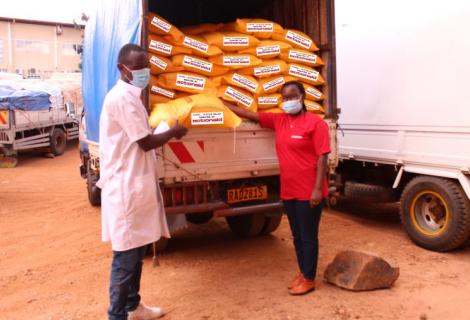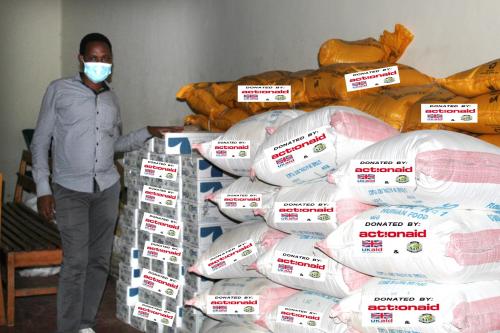COVID-19: Informal workers unable to feed their families, relying on Food relief

Like all other countries across the world, Rwanda is affected by COVID-19 pandemic, especially from 14th March 2020 when the first COVID-19 case was recorded in Rwanda.
To curb the spread of COVID-19, many countries including Rwanda implemented lockdown measures that have brought much of global economic activity to a halt.
Due to the 40 days lockdown in Rwanda which started on 21st March 2020 and was eased on 2nd May 2020, many businesses and institutions reduced operations and others including bars are closed, hence increasing unemployment.
The shutdown also negatively impacted households which depended on daily income to survive as most breadwinners in households were not working, yet daily expenses had to be catered for. This exacerbated poverty in those households to a point that it was very hard for them to get food and other necessary items.
To respond to this problem, the Government of Rwanda has supported vulnerable people with basic needs like food and hygienic materials, but the government’s support was not enough since it was few compared to people in need, hence not reaching all targeted people.
In this context, ActionAid Rwanda (AAR) as an organization that promotes human rights, with reference to its priority II of “Strengthening resilient livelihoods and secure climate justice, ensuring women smallholder farmers’ access to market and credit for increased agricultural production and food security”, with its specific focus of “ensuring access to land, resilient livelihoods and food Security”, supported over 1,200 families economically affected by the COVID-19 lockdown in Rwanda with food relief including around 12 tons of rice, 8 tons of maize flour and 5 tons of Beans.
Among these food items, 5 tons of Rice,5 tons of Beans and 5 tons of Maize Flour were donated through to the National Strategic Food Reserve which distributed the food relief to 500 most affected families on grassroots level, while the remaining 7 tons of rice and 3 tons of maize flour were distributed to 753 families affected by COVID -19 in Murundi and Gitesi Sectors of Karongi District and Busasamana, Mukingo and Rwabicuma Sectors of Nyanza District, in collaboration with the District’s administration.
The food relief items distributed in Karongi and Nyanza Districts were supported by Speak Out project, funded by the UK Aid. The two Districts were selected among 5 Districts in which ActionAid Rwanda operates because both districts are semi urban, therefore community members in those Districts do casual works and their livelihoods rely on their daily wages. Apart from doing casual work, communities in Karongi and Nyanza Districts also have very little land for cultivation, therefore during the COVID-19 lockdown it was a challenge for them to get food to put on the table.
ActionAid Rwanda (AAR) channeled the COVID-19 food relief through the National Strategic Food Reserve and the Districts’ administration because this is the channel recommended by the Government of Rwanda to provide COVID-19 food relief to affected communities, to ensure enhanced coordination of the COVID-19 food relief.
“ActionAid Rwanda worked with the local administration in each district to develop lists of families most affected by COVID-19, to ensure that our support benefits people in need. We worked with Districts’ authorities to set ways of distribution following COVID-19 personal protection measures,” said Josephine Irene Uwamariya, ActionAid Rwanda Country Director.
Mukarutesi Chantal, is one of beneficiaries of AAR Food Relief. Chantal, a mother of 4 children, lives in Mukingo Sector, Nyanza District. She says that the food package she received from ActionAid Rwanda saved her family from starvation during the lockdown.
“My husband works in a bar in Kigali City, then sends me money so that I look after children. When the COVID-19 lockdown started, bars were closed, and his job stopped. So, it was very hard for us to get food and other basic needs for the family. It was really hard,” Chantal said.
“I received 10 kgs of rice, 5kg of maize flour and 3 bars of soap. I managed well these food items and they sustained us for a month. I am really grateful to ActionAid Rwanda for this food support,” She added.
The food and hygienic materials kits supported by ActionAid Rwanda helped communities in my sector, especially daily wage workers whose job had stopped, to survive during the lockdown. We really appreciate ActionAid Rwanda’s support and collaboration in responding to COVID-19,” said Niyonsaba Cyriaque, Executive Secretary of Gitesi Sector, Karongi District.

